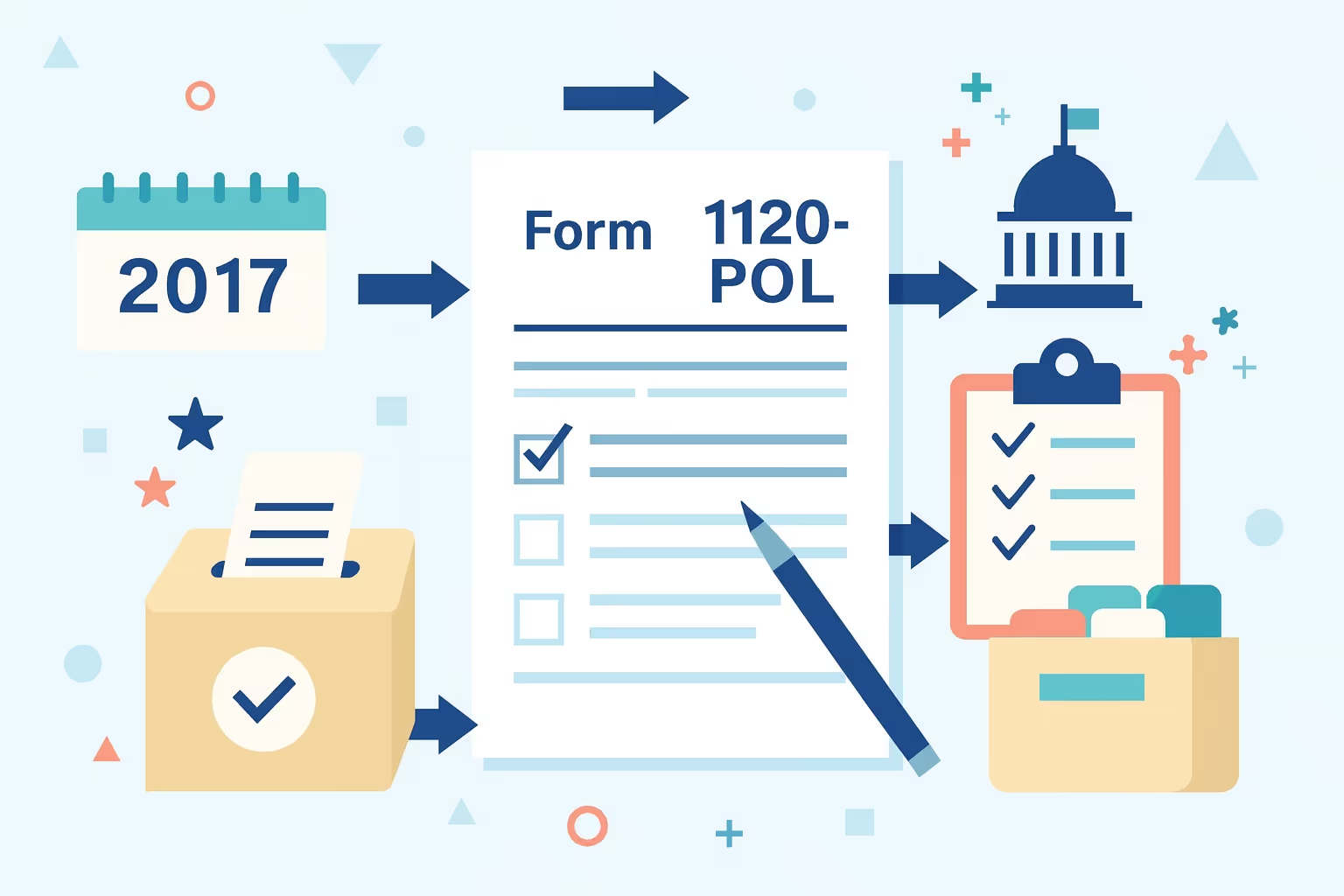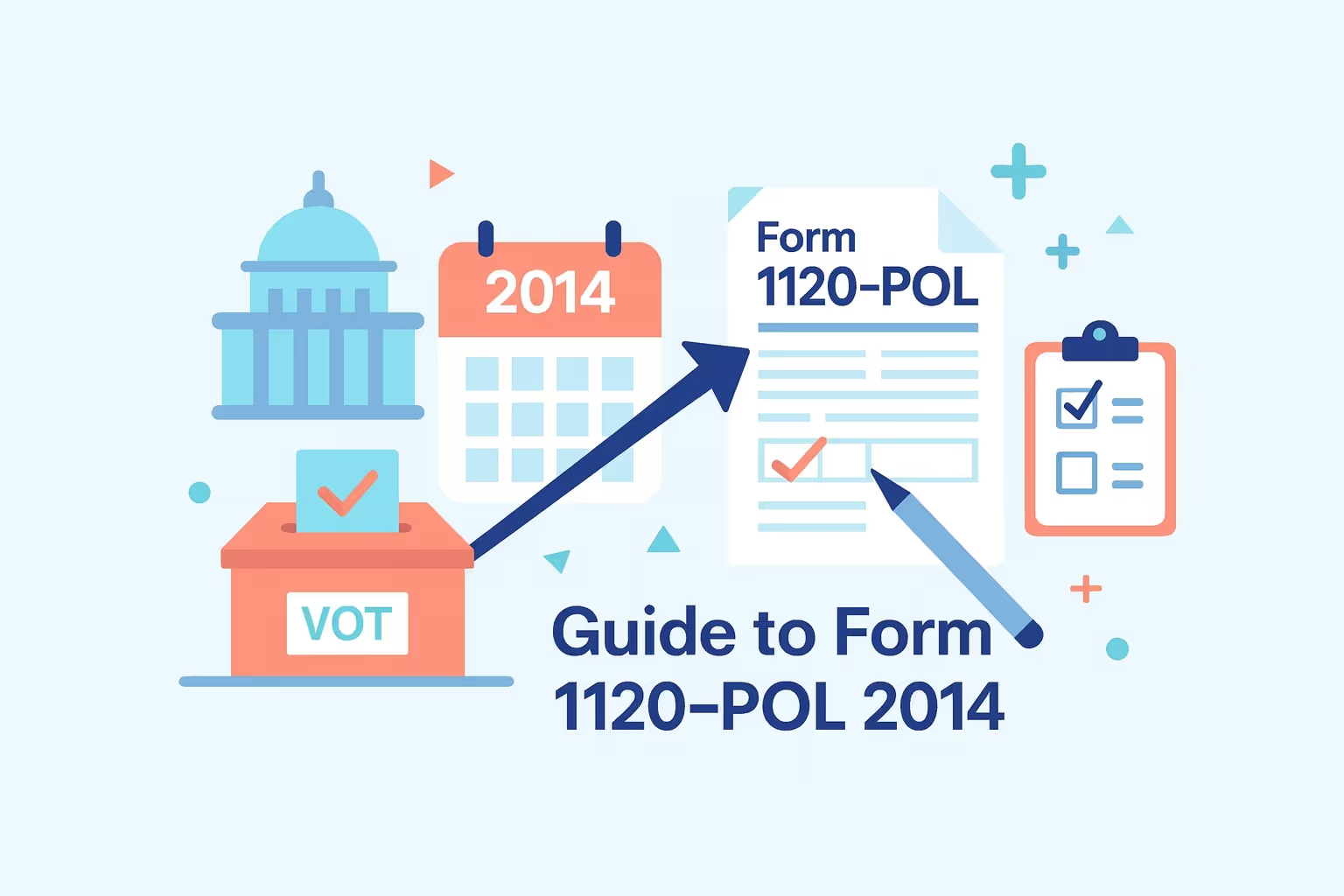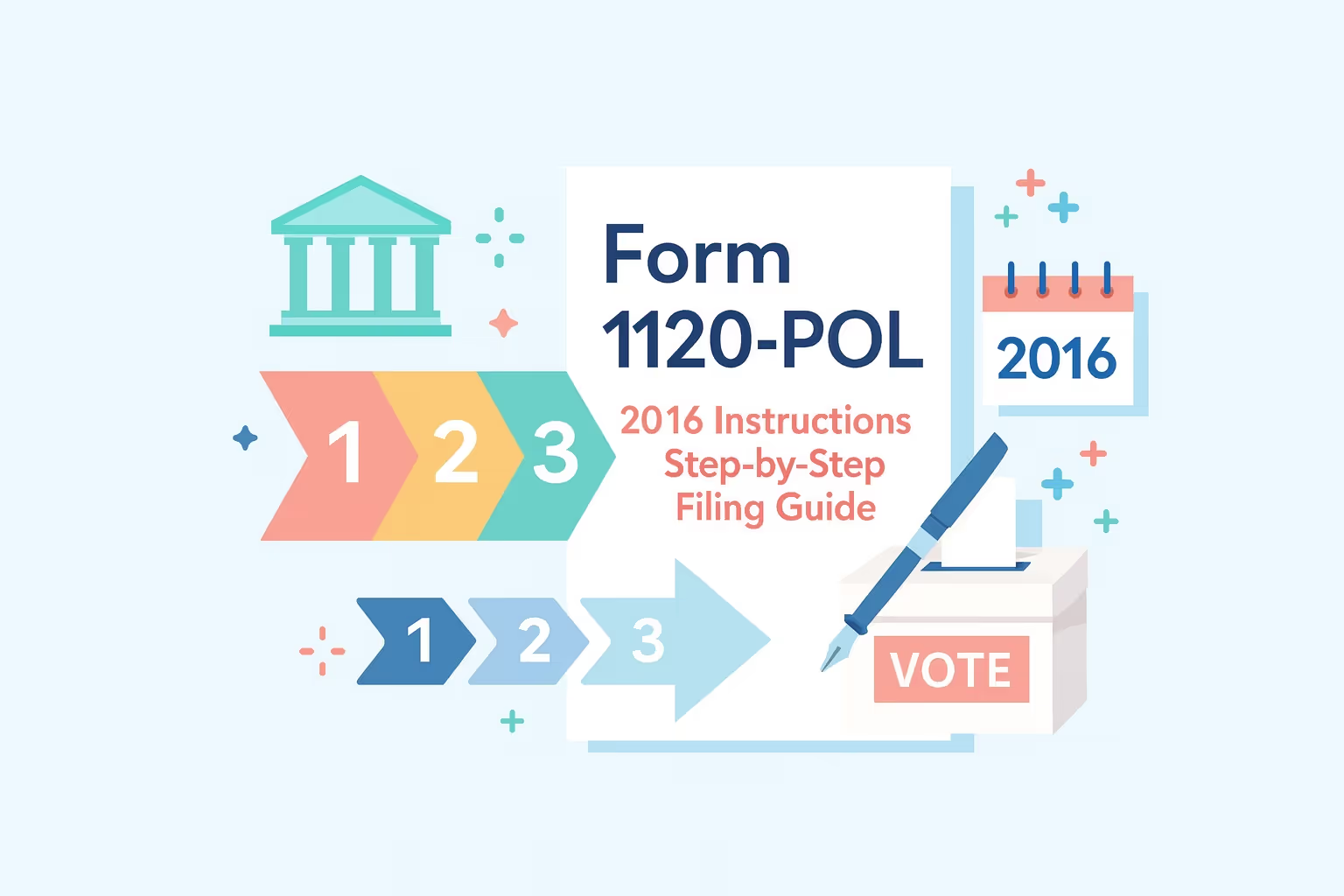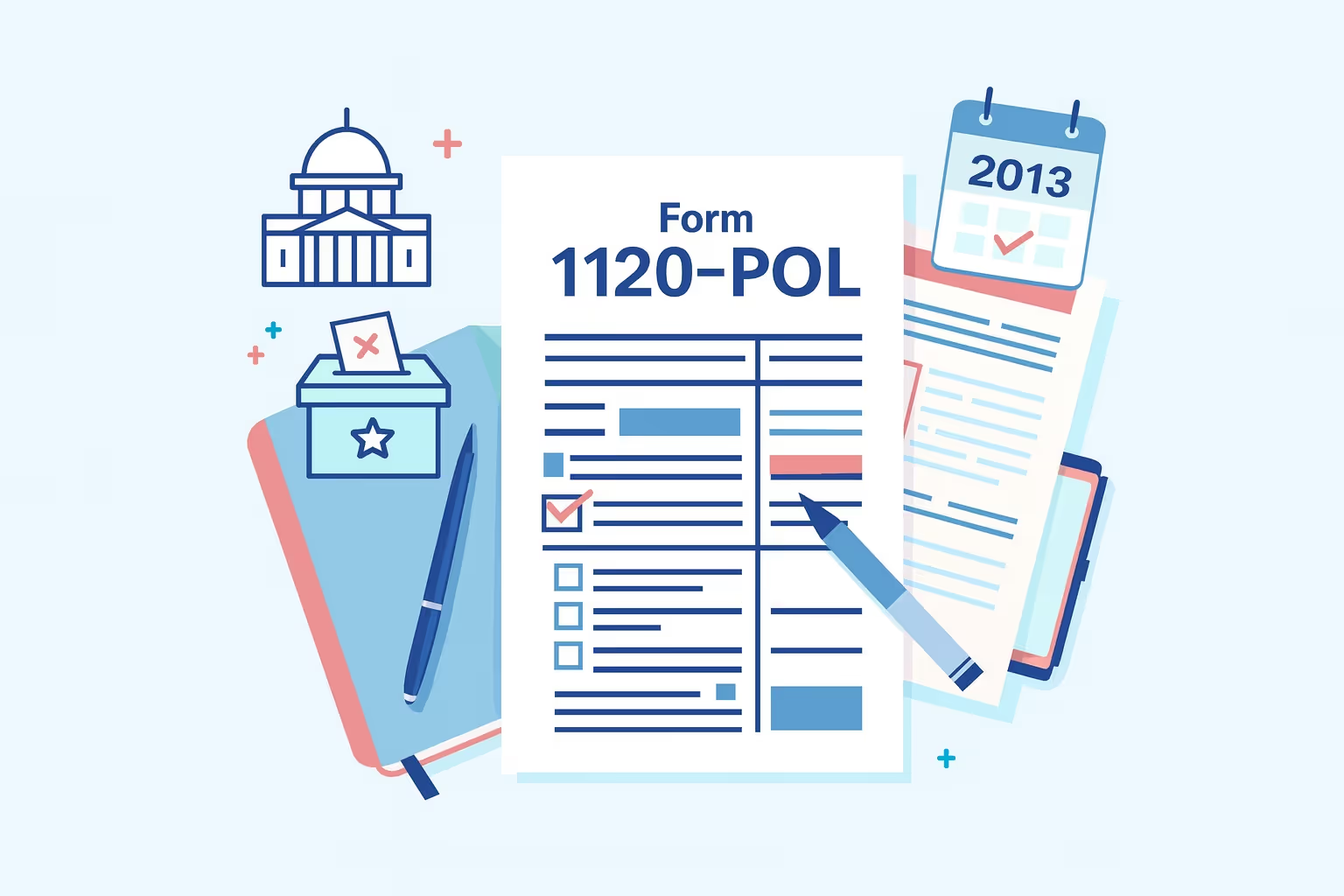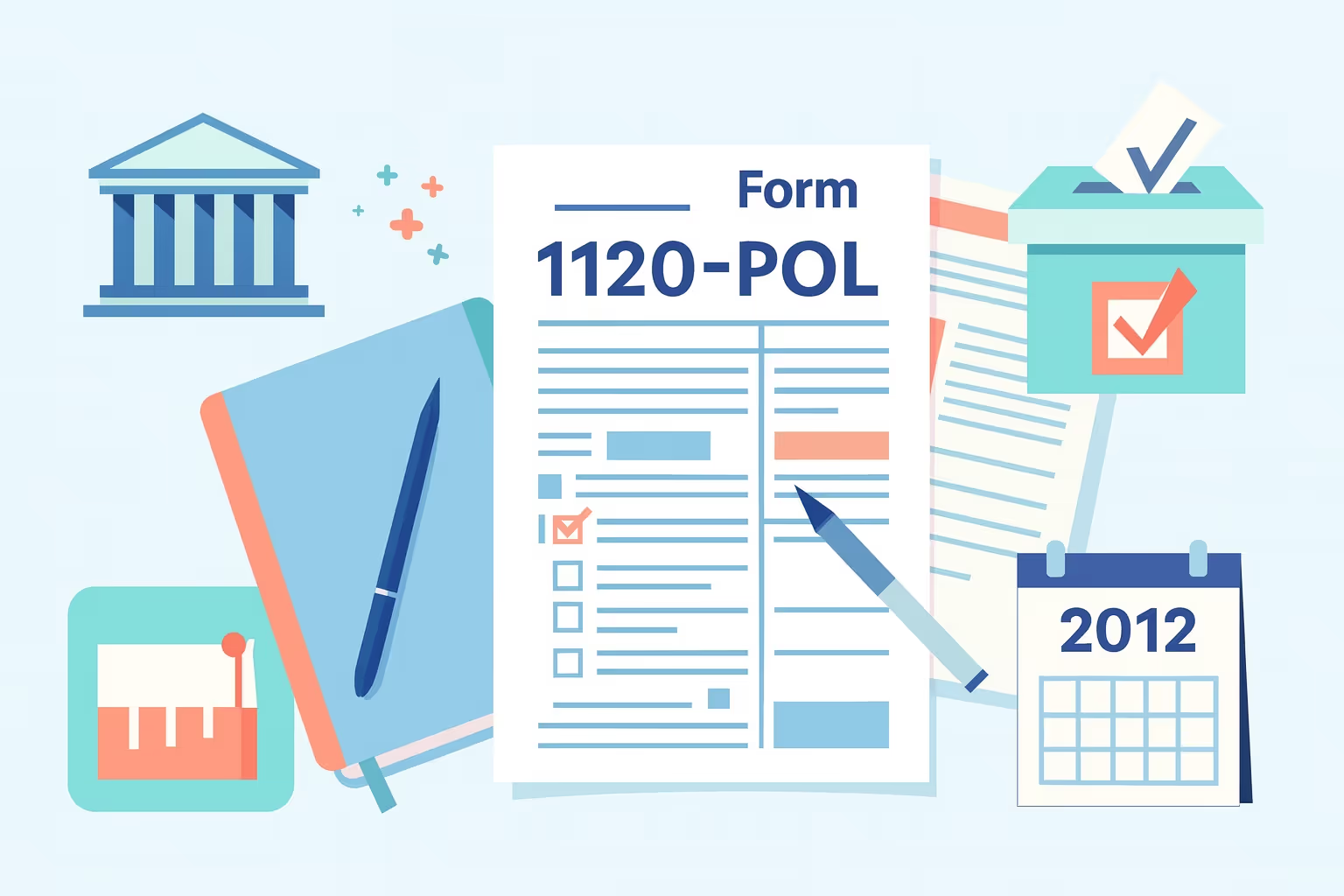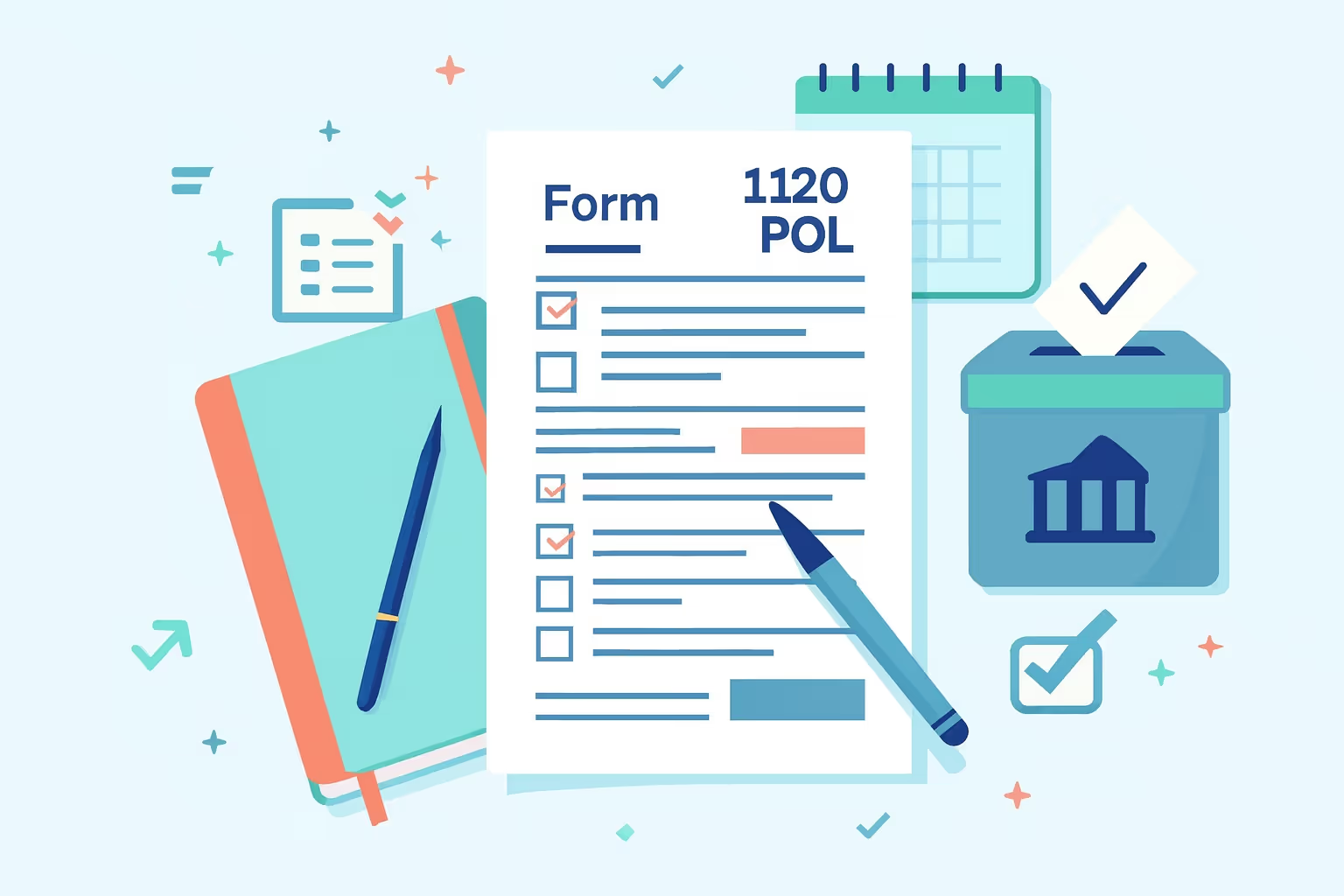
Filing taxes can feel complicated for political organizations, but understanding the process begins with the proper guidance. Form 1120-POL is the federal income tax return used by political organizations that earn taxable income under Section 527 of the Internal Revenue Code. Whether your group is a campaign committee, political action committee (PAC), or local organization, completing this form correctly helps you stay compliant and avoid unnecessary IRS penalties.
The Form 1120 POL 2022 instructions for political organizations explain how to report income unrelated to your exempt political activities, such as investment or rental earnings. While most contributions and campaign funds are exempt from federal income tax, these other income sources must be reported accurately. This guide breaks down each step, from determining if you must file to calculating tax liability, submitting payment, and attaching the required tax forms.
Some rules have changed for the 2022 tax year, including updates to electronic filing and continued requirements for the 21% tax rate and $100 deduction. This article provides a clear, beginner-friendly walkthrough of how to file Form 1120-POL, understand taxable versus exempt income, and meet the Internal Revenue Service (IRS) filing standards. By following these instructions, political organizations can confidently and accurately prepare and submit income tax returns.
What Is IRS Form 1120-POL?
Form 1120-POL, officially titled U.S. Income Tax Return for Certain Political Organizations, is the federal income tax return used by political organizations that earn taxable income. It applies to groups governed by Section 527 of the Internal Revenue Code, which outlines how political organizations report and pay taxes on income not directly tied to their exempt political activities. Understanding how this form works helps organizations maintain compliance and avoid IRS penalties.
Purpose and Overview
Form 1120-POL allows political organizations to report taxable income that does not come from political campaign operations. While contributions, membership dues, and fundraising proceeds are generally exempt from federal income tax, other types of income must be reported. Political organizations use this form to report:
- Investment income includes dividends, interest, and capital gains earned annually.
- Business income comes from activities unrelated to the organization’s political purpose.
- Improperly segregated exempt funds, which are intended for non-political purposes, become taxable.
Filing this form ensures that the Internal Revenue Service (IRS) can calculate an organization’s income tax liability and verify compliance with federal reporting rules.
Who Must File Form 1120-POL
According to the IRS instructions, the following individuals or entities must file:
- Any political organization, whether tax-exempt or not, has taxable income.
- Specific exempt organizations under Section 527(f)(1) are treated as having taxable political organization income.
Political organizations are taxed at a flat rate of 21% and may claim a $100 specific deduction, except for newsletter funds.
Types of Political Organizations That File
Organizations that commonly file Form 1120-POL include the following:
- Political parties operate at the federal, state, or local level and raise funds for election-related activities.
- Candidate committees that collect and manage campaign contributions and expenditures.
- Political action committees (PACs) raise and spend funds to support candidates, ballot measures, or political causes.
- Newsletters are funds elected officials use to communicate with constituents.
- Exempt organizations establish Section 501(c) segregated funds to finance political efforts.
Filing accurately helps ensure compliance with IRS standards and prevents reporting delays or penalties.
What’s New for Tax Year 2022
Several essential updates affect how political organizations prepare and file Form 1120-POL for the 2022 tax year. These changes ensure compliance with the latest IRS filing and reporting requirements.
- Section 965(a) inclusion amounts no longer apply: Organizations no longer need to include amounts from Section 965(a) when calculating taxable income. However, if an organization made installments under a previous election, it must still attach Form 965-B to its 2022 return.
- The 21% tax rate remains unchanged: Political organizations continue to pay a flat 21% tax rate on taxable income. The $100 specific deduction still applies, except for newsletter funds, which cannot be claimed.
- Electronic filing remains optional for 2022: Most organizations may still file paper returns for 2022, but electronic filing becomes mandatory for tax years ending on or after December 31, 2023, for organizations that file 10 or more returns annually.
For detailed guidance and updates, visit the official IRS page for Form 1120-POL.
Step-by-Step Instructions for Completing Form 1120-POL
Preparing Form 1120-POL is easier when you follow a straightforward process. The steps below guide treasurers and staff through eligibility, records, calculations, attachments, and submission, with practical notes that help prevent delays or penalties.
Step 1—Confirm that you must file
- Determine whether your organization qualifies as a political committee, a party committee, a fund that influences elections, or a local public office.
- Verify that you had a political organization's taxable income for the year.
- Remember that specific exempt organizations under Section 527(f)(1) are treated as having political organization taxable income and must file when those rules apply.
Step 2—Choose the correct tax year and track deadlines
- Use the organization’s accounting period to decide the tax year shown on the form.
- Mark the due date: the 15th day of the fourth month after the tax year ends.
- If you fail to file on time and owe tax, the minimum penalty rules may apply, along with interest.
- Please retain a copy of the original return for your records, as any future corrections will necessitate a separate amended return.
Step 3—Gather IDs, records, and support
- Verify your Employer Identification Number (EIN) and ensure it is safeguarded as part of your data security practices.
- Collect statements for dividends, interest, rents, royalties, capital gains, and any business income from other sources.
- Assemble invoices and receipts for deductions that are directly connected to taxable income.
- If questions arise, consider scheduling an appointment with a qualified tax professional.
Step 4—Separate taxable and exempt function amounts
- Treat contributions, membership dues, and fundraising used for political activities as exempt function income.
- Report taxable income unrelated to exempt functions, including investment income and improperly segregated funds.
- To trace the money flow, maintain bank accounts and ledgers that clearly distinguish between exempt function and taxable activity.
Step 5—Complete income lines (Lines 1–8)
- Line 1 (Dividends): Enter dividends and attach a statement listing payers and amounts.
- Line 2 (Interest): Enter interest from banks and brokers, and keep annual reports with your files.
- Line 3 (Gross rents) and Line 4 (Gross royalties): Use year-end ledgers to support totals.
- Line 5 (Capital gains): Report net gains and complete Schedule D when required.
- Line 6 (Form 4797): Report gains or losses from sales of business property.
- Line 7 (Other income): This line should include ordinary income from partnerships and similar sources.
- Line 8 (Total income): Add Lines 1–7 to compute total income.
Step 6—Complete deduction lines (Lines 9–16)
- Deduct only expenses directly connected to producing taxable income, such as salaries for staff who manage taxable investments.
- Where applicable, report repairs, rents, taxes, licenses, interest, and depreciation, attaching Form 4562 if depreciation is claimed.
- Itemize “other deductions” on an attached statement, describing what was purchased and how it relates to taxable income.
- All deductions are in line 16, so the figure matches the documentation you retain.
Step 7—Compute tax and complete lines (Lines 17–25)
- If you are an exempt organization subject to Section 527(f)(1), complete Lines 17a–17c as directed in the instructions.
- Claim the $100 specific deduction on Line 18, noting that newsletter funds may not claim it.
- Compute taxable income on Line 19 and calculate the tax at 21 percent on Line 20.
- Apply credits on Line 21 and compute total tax on Line 22.
- Enter payments and credits on Lines 23a–23d.
- If Line 24 shows tax due, arrange an electronic payment; if Line 25 shows an overpayment, request a refund or apply the amount forward.
Step 8—Attach forms and statements
- Attach Schedule D for capital gains and Form 4797 for business property.
- Include Form 4136 when you are claiming the credit for federal taxes paid on fuels.
- Provide supporting statements for dividends, other income, and other deductions, because the agency may request them during review.
Step 9—E-file or mail, then keep proof.
- Submit electronically through an approved platform, or mail to the correct service center for the year.
- If e-filing is not an option, please submit a paper return and retain the tracking details.
- After filing, print submission acknowledgments, payment confirmations, and a full copy of the return for your records.
Step 10—Fix errors the right way
- If you discover a mistake after filing, prepare an amended return and check the “Amended return” box.
- Include an explanation of changes and any updated schedules.
- Keep copies of both the original and amended filings with supporting documentation.
Step 11—Monitor updates and store records
- Retain bank statements, broker reports, invoices, and worksheets for at least three years after filing.
- Review the latest information from the IRS before each filing season, as rules may change.
- Remind users who assist with the return to follow internal controls that protect data and support accuracy.
Submitting a complete return with accurate attachments and timely payment reduces processing issues and helps your organization meet all income tax responsibilities efficiently.
How to File Your Form 1120-POL
Filing Form 1120-POL correctly helps political organizations meet their federal tax obligations and avoid penalties. Depending on your organization's preferences and filing requirements, you can complete the process by mail or electronically.
Mailing Address for Paper Filing (2022)
Most political organizations filed paper returns for the 2022 tax year. Use the following addresses based on your organization’s location:
- For organizations located in the United States:
Department of the Treasury
Internal Revenue Service Center Ogden, UT 84201 - For foreign organizations:
Internal Revenue Service Center
P.O. Box 409101 Ogden, UT 84409
If you use a private delivery service, you must send the form to the street address listed for the IRS service center instead of a P.O. Box. Always confirm the current mailing address on the IRS website before submitting.
Electronic Filing Options
For tax year 2022, electronic filing was optional for most organizations. Beginning with returns for tax years ending on or after December 31, 2023, political organizations filing ten or more returns annually must e-file. Electronic filing is faster, reduces errors, and provides confirmation that the Internal Revenue Service received your return.
Filing Deadlines and Extensions
The due date for Form 1120-POL is the 15th day of the fourth month after your organization’s tax year ends. For example, if your organization uses a calendar year ending December 31, the return is due April 15. To request additional time, file Form 7004 for an automatic six-month extension.
Paying Your Tax Liability
Once your Form 1120-POL is complete, review the total tax liability on Line 24. Political organizations must pay any balance due by the same date as the return to avoid penalties and interest.
Payment Methods
The Internal Revenue Service (IRS) requires most political organizations to pay electronically using the Electronic Federal Tax Payment System (EFTPS). This secure system allows you to make federal tax payments online or by phone, ensuring that payments are processed quickly and accurately.
To use EFTPS, follow these steps:
- Enroll at www.EFTPS.gov or by calling 800-555-4477 to set up your organization’s account.
- Ensure your payment is scheduled at least one business day before the due date to allow for processing time and prevent late penalties.
- Ensure that the payment amount corresponds with the balance on your Form 1120-POL, and verify that the payment date aligns with your filing deadline.
- Keep your confirmation number in your organization’s tax records as proof of submission.
Using EFTPS ensures your payment is credited promptly and provides an official record that your organization met its IRS payment obligations.
Common Payment Mistakes
- Do not include payments with your paper return: The IRS does not accept checks or cash mailed with Form 1120-POL.
- Verify payment deadlines: To be considered timely, EFTPS payments must be submitted by 8 p.m. Eastern Time on the day before the due date.
- Avoid misapplied payments: When making payments, always ensure your organization’s Employer Identification Number (EIN) and tax year are correct.
Making payments electronically provides faster confirmation and ensures compliance with IRS requirements.
Common Filing Errors to Avoid
Completing Form 1120-POL requires accuracy and attention to detail. Even small mistakes can delay processing or result in penalties. Reviewing your entries before submission helps ensure compliance with IRS rules and prevents common filing issues that affect political organizations, including specific exempt organizations under Section 527(f)(1).
Reporting Exempt Function Income as Taxable
Many filers mistakenly report exempt function income—such as campaign contributions, membership dues, or fundraising proceeds—as taxable. Only investment income, business income, or improperly segregated funds should be taxed. Carefully review each income source before you fill out the form to ensure accuracy.
Deducting Unrelated or General Expenses
Organizations sometimes deduct general administrative expenses that are not tied to taxable income. Only expenses directly related to producing taxable income are deductible. To avoid agency adjustments, maintain detailed records linking each expense to the income it supports.
Claiming the $100 Deduction for Newsletter Funds
The $100 specific deduction applies to most political organizations but not newsletter funds. These must report all taxable income without claiming the deduction, even if they are part of specific exempt organizations.
Missing Deadlines or Using the Wrong Tax Year
The due date for Form 1120-POL is the 15th day of the fourth month after the organization’s tax year ends. If you fail to file on time or use an incorrect tax year, you may incur penalties and interest. If you find it challenging to meet the deadline, you might want to consider filing Form 7004 for an extension.
Mailing Payments with the Return
Never include checks or cash with a paper return. The Internal Revenue Service requires electronic payments through EFTPS or a same-day wire transfer. Double-check payment details before submission to prevent delays or misapplied payments.
By avoiding these errors, political organizations can reduce penalties, ensure proper filing, and maintain compliance with the latest federal tax rules.
First-Time Filer Tips for Political Organizations
Filing Form 1120-POL for the first time can feel overwhelming, but careful preparation helps ensure compliance and accuracy. Political organizations should focus on setting up proper records, understanding their tax obligations, and following IRS filing procedures closely.
- Obtain an Employer Identification Number (EIN)
Every political organization must have an EIN before filing. You can apply online through the IRS website or by calling 267-941-1099 if your organization is based outside the United States. This number identifies your organization for all federal tax purposes.
- Choose an Accounting Method
Select either the cash or accrual method for reporting income and deductions. Once chosen, remain consistent in future filings. A change in method requires IRS approval by filing Form 3115.
- Maintain Accurate Recordkeeping
Keep detailed financial records that separate exempt function income from taxable income. Organized bookkeeping ensures accuracy when completing Form 1120-POL and simplifies future audits or amendments.
- File Additional Required Forms
Some organizations must also file Form 8871 (Notice of Section 527 Status) and Form 8872 (Political Organization Report of Contributions and Expenditures). Timely filing of these forms helps maintain tax-exempt status.
- Seek Professional Assistance if necessary.
Consider consulting a qualified tax professional if you have any uncertainties about reporting rules or deductions. Proper guidance can prevent penalties and ensure your organization remains in excellent standing with the Internal Revenue Service.
Important IRS Resources and Links
Accessing reliable information directly from the Internal Revenue Service (IRS) ensures your organization follows the most current rules for Form 1120-POL. The following official resources provide instructions, filing updates, and payment tools to help political organizations stay compliant:
- Form 1120-POL and Instructions: Visit the IRS Form 1120-POL page for official forms, filing guidance, and updates for the 2022 tax year.
- Political Organization Filing Requirements: Review the IRS guidelines for political organizations under Section 527 to confirm which forms and schedules apply.
- Electronic Federal Tax Payment System (EFTPS): Access EFTPS to secure electronic tax payments online or by phone.
- Form 7004 – Extension Request: Use this form to request an automatic six-month extension if you cannot meet your filing deadline.
- IRS Helpline: For assistance, contact the Exempt Organizations helpline at 877-829-5500 (Monday through Friday).
Referencing these sources ensures that your organization’s income tax return remains accurate and compliant with all federal requirements.
Frequently Asked Questions (FAQs)
Who must file an income tax return using Form 1120-POL?
Any political organization with taxable income must file Form 1120-POL. This includes political parties, PACs, and candidate committees earning investment or business income. Even exempt organizations under Section 527(f)(1) must file if they receive taxable political organization income during the year. Filing ensures compliance with IRS reporting and income tax rules.
Which tax forms are required with Form 1120-POL?
Depending on their activities, political organizations may need additional tax forms. Standard attachments include Schedule D for capital gains, Form 4797 for business property sales, and Form 4136 for fuel tax credits. Reviewing the official IRS Form 1120-POL instructions ensures that all required schedules and forms are filed accurately to meet federal compliance standards.
What is the due date for filing Form 1120-POL?
The due date for Form 1120-POL is the 15th day of the fourth month after your organization’s tax year ends. For calendar-year filers, the return is due April 15. To avoid late penalties, file Form 7004 to request an automatic six-month extension if additional time is needed to prepare your return and confirm all information.
Are exempt organizations required to file Form 1120-POL?
Yes, exempt organizations with taxable political organization income must still file Form 1120-POL, even if they usually operate as tax-exempt under Section 527. Taxable income may include investment gains, interest, or improperly segregated funds. Filing this form ensures transparency and proper calculation of the organization’s income tax liability to maintain compliance with IRS regulations.
What other forms might political organizations need to submit?
Besides Form 1120-POL, political organizations may need to file other forms, such as Form 8871 to register under Section 527 and Form 8872 to report contributions and expenditures. These filings allow the Internal Revenue Service to verify compliance and confirm that political organizations engage in financial activities related to tax-exempt and taxable functions.











